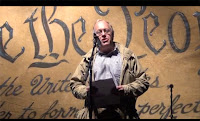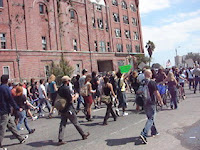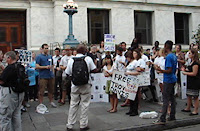-EPA Administrator Lisa Jackson should be tarred and feathered, and fired, not necessarily in that order. She is what used to be known as a scalawag, but she's the worst kind, for she has complicity in poisoning millions along the Gulf Coast, including her own kin and fellow citizens of Louisiana.
In this Democracy Now! interview, Hugh Kaufman, a senior policy analyst at the EPA's Office of Solid Waste and Emergency Response, spills the beans about how Lisa Jackson and the EPA has been part of a massive cover-up of what are crimes against humanity: poisoning millions along the Gulf Coast with the highly toxic Corexit dispersants, which, when combined with crude oil, is even more harmful to all life forms. Why? To spare BP from paying $ millions in additional fines for the oil it's responsible for releasing into the Gulf of Mexico.
Kaufman was a leading critic of the decision to use Corexit. His criticisms have been joined by numerous toxicologists, marine scientists, physicians, and activists throughout the world, but, unfortunately, very few members of Congress. Only Rep. Jerrod Nadler (D-New York), Rep. Ed Markey (D-Massachusetts), Sen. Barbara Mikulski (D-Maryland), and Sen. Frank Lautenberg (D-New Jersey) have thus far stepped forward with urgency to halt the use of dispersants until scientific studies are conducted on these substances. These are studies that the EPA has failed to do.
God bless the above-mentioned U.S. representatives and senators, Hugh Kaufman, Democracy Now! and the independent journalist Dahr Jamail and the online journal Truthout.org (see "
Toxic Dispersants Near Gulf Harm Humans and Wildlife") for exposing the truth about the dangerous toxicity of dispersants. Several working groups in the New Orleans area, along with a Louisiana native in Hawaii and a good doctor in Brazil, have been working tirelessly these past weeks to learn about these dispersants, alert the public, and put a stop to their use.
It's shameful that not one single elected official from Louisiana or any other Gulf coast state has stepped forward to speak the truth about dispersants, to try to halt their use, or to take steps to protect the public from them. The
Times-Picayune won a Pulitzer for its coverage of the failed Corps of Engineers levees during and after Hurricane Katrina. Five years later, they've decided to be part of the cover-up. All of them must be held to account in these coming months.
[transcript]
SHARIF ADBEL KOUDDOUS: The Obama administration has given BP the go-ahead to keep its ruptured well sealed for another day despite worries about the well leaking some oil and methane gas. National Incident Commander Thad Allen said the seep was not cause for alarm.
Meanwhile, the Occupational Safety and Health Administration, or OSHA, has released its analysis of BP’s data on the exposure of cleanup workers to the chemical dispersants being used in the Gulf. OSHA chief David Michaels told the environmental website Greenwire that, quote, "I think you can say exposures are low for workers. Exposures of workers on shore are virtually nonexistent. There are significant exposures near the source, and that’s to be expected given the work being done there. Those workers are given respiratory protection," he said.
But with BP having poured nearly two million gallons of the dispersant known as Corexit into the Gulf, many lawmakers and advocacy groups say the Obama administration is not being candid about the lethal effects of dispersants. At a Senate subcommittee hearing last week, Maryland Democrat Barbara Mikulski grilled administrators from the EPA about Corexit and said she didn’t want dispersants to be the Agent Orange of this oil spill.
SEN. BARBARA MIKULSKI: I’m concerned because I feel and I believe, and my reading verifies, that we don’t know enough about the impact of dispersants and dispersed oil on people, marine life and water quality. I’m very concerned. And my question is, should we ban them? Should we take a time out from using them? What are the short- and long-term consequences of using them? I don’t want dispersants to be the Agent Orange of this oil spill. And I want to be assured, in behalf of the American people, that this is OK to use and OK to use in the amounts that we’re talking about.
AMY GOODMAN: Maryland Senator Barbara Mikulski.
While concerns over the impact of chemical dispersants continue to grow, Gulf Coast residents are outraged by a recent announcement that the $20 billion government-administered claim fund will subtract money cleanup workers earn by working for the cleanup effort from any future claims. Fund administrator Kenneth Feinberg says the ruling will apply to anyone who participates in the Vessels of Opportunity program, which has employed hundreds of Gulf Coast residents left out of work because of the spill. It’s seen as an effort to limit the number of lawsuits against BP.
We’re joined now by two guests on these two issues, on Corexit and the workers. Independent journalist Dahr Jamail is joining us from Tampa, Florida. He’s been reporting from the Gulf Coast for three weeks. His latest article at Truthout is called "BP’s Scheme to Swindle the 'Small People.'" And from Washington, DC, we’re joined by Hugh Kaufman, a senior policy analyst at the EPA’s Office of Solid Waste and Emergency Response. He’s been a leading critic of the decision to use Corexit.
We welcome you both to Democracy Now! Let’s begin with Hugh Kaufman. First of all, explain what Corexit is, the company that makes it, what’s in it, and your concerns.
HUGH KAUFMAN: Well, Corexit is one of a number of dispersants, that are toxic, that are used to atomize the oil and force it down the water column so that it’s invisible to the eye. In this case, these dispersants were used in massive quantities, almost two million gallons so far, to hide the magnitude of the spill and save BP money. And the government—both EPA, NOAA, etc.—have been sock puppets for BP in this cover-up. Now, by hiding the amount of spill, BP is saving hundreds of millions, if not billions, of dollars in fines, and so, from day one, there was tremendous economic incentive to use these dispersants to hide the magnitude of the gusher that’s been going on for almost three months.
Congressman Markey and Nadler, as well as Senator Mikulski, have been heroes in this respect. Congressman Markey made the BP and government put a camera down there to show the public the gusher. And when they did that, experts saw that the amount of material, oil being released, is orders of magnitudes greater than what BP and NOAA and EPA were saying. And the cover-up started to evaporate.
But the use of dispersants has not. Consequently, we have people, wildlife—we have dolphins that are hemorrhaging. People who work near it are hemorrhaging internally. And that’s what dispersants are supposed to do. EPA now is taking the position that they really don’t know how dangerous it is, even though if you read the label, it tells you how dangerous it is. And, for example, in the Exxon Valdez case, people who worked with dispersants, most of them are dead now. The average death age is around fifty. It’s very dangerous, and it’s an economic—it’s an economic protector of BP, not an environmental protector of the public.
Now, the one thing that I did want to mention to you, Amy, that’s occurred in most investigations, back even in the Watergate days, people said, "follow the money." And that’s correct. In this case, you’ve got to follow the money. Who saves money by using these toxic dispersants? Well, it’s BP. But then the next question—I’ve only seen one article that describes it—who owns BP? And I think when you look and see who owns BP, you find that it’s the majority ownership, a billion shares, is a company called BlackRock that was created, owned and run by a gentleman named Larry Fink. And Vanity Fair just did recently an article about Mr. Fink and his connections with Mr. Geithner, Mr. Summers and others in the administration. So I think what’s needed, we now know that there’s a cover-up. Dispersants are being used. Congress, at least three Congress folks—Congressman Markey, Congressman Nadler and Senator Mikulski—are on the case. And I think the media now has to follow the money, just as they did in Watergate, and tell the American people who’s getting money for poisoning the millions of people in the Gulf.
AMY GOODMAN: We’re talking to Hugh Kaufman, who works at the Environmental Protection Agency. This is an issue we’ve brought up before, but it’s an absolutely critical one, the issue of proprietary information of these companies, in particular, the ingredients of Corexit, even though 1.8 million pounds of it have been dumped into the Gulf. What’s in Corexit? Do you know? What is EPA allowed to know, and what is the company allowed to keep private?
HUGH KAUFMAN: EPA has all the information on what’s in—the ingredients are. The largest ingredient in Corexit is oil. But there are other materials. And when the ingredients are mixed with oil, the combination of Corexit or any dispersant and oil is more toxic than the oil itself. But EPA has all that information. That’s a red herring issue being raised, that we have to somehow know more information. When you look at the label and you look at the toxicity sheets that come with it, the public knows enough to know that it’s very dangerous. The National Academy of Science has done work on it. Toxicologists from Exxon that developed it have published on it. So, we know enough to know that it’s very dangerous, and to say that we just have to know more about it is a red herring issue. We know plenty. It’s very dangerous. And in fact, Congressman Nadler and Senator Lautenberg are working on legislation to ban it.
AMY GOODMAN: And I should correct myself: 1.8 million gallons, I think it is, of Corexit that’s been dumped. Sharif?
SHARIF ADBEL KOUDDOUS: And Hugh Kaufman—
HUGH KAUFMAN: Tha’s correct, almost two million gallons of—yes, sir.
SHARIF ADBEL KOUDDOUS: So the—
HUGH KAUFMAN: I’m sorry, I’m not—
SHARIF ADBEL KOUDDOUS: No, no, go ahead. The dispersant is—
HUGH KAUFMAN: I’m not hearing you, sir.
SHARIF ADBEL KOUDDOUS: These nearly two million gallons have been dispersed not only on the surface of the water, but also 5,000 feet below the water, as well. Can you talk about that?
HUGH KAUFMAN: Well, not only do you have airplanes flying and dropping them on the Gulf region, like Agent Orange in Vietnam, but a large amount of it is being shot into the water column at 5,000 feet to disperse the oil as it gushers out. And so, you have spread, according to the Associated Press, over perhaps over 44,000 square miles, an oil and dispersant mix. And what’s happened is, that makes it impossible to skim the oil out of the water. One of the things that happened is they brought this big boat, Whale, in from Japan to get rid of the oil, and it didn’t work because the majority of the oil is spread throughout the water column over thousands of square miles in the Gulf. And so—and there’s been a lot of work to show the dispersants, which is true, make it more difficult to clean up the mess than if you didn’t use them. The sole purpose in the Gulf for dispersants is to keep a cover-up going for BP to try to hide the volume of oil that has been released and save them hundreds of millions, if not billions, of dollars of fines. That’s the purpose of using the dispersants, not to protect the public health or environment. Quite the opposite.
AMY GOODMAN: You’ve made comparisons between Corexit, the use of Corexit and hiding BP’s liability, and what happened at Ground Zero after the attacks of September 11th, Hugh Kaufman.
HUGH KAUFMAN: Yeah, I was one of the people who—well, I did. I did the ombudsman investigation on Ground Zero, where EPA made false statements about the safety of the air, which has since, of course, been proven to be false. Consequently, you have the heroes, the workers there, a large percentage of them are sick right now, not even ten years later, and most of them will die early because of respitory problems, cancer, etc., because of EPA’s false statements.
And you’ve got the same thing going on in the Gulf, EPA administrators saying the same thing, that the air is safe and the water is safe. And the administrator misled Senator Mikulski on that issue in the hearings you talked about. And basically, the problem is dispersants mixed with oil and air pollution. EPA, like in 9/11—I did that investigation nine years ago—was not doing adequate and proper testing. Same thing with OSHA with the workers, they’re using mostly BP’s contractor. And BP’s contractor for doing air testing is the company that’s used by companies to prove they don’t have a problem. If you remember the wallboard pollution problem from China, the wallboard from China, this company does that environmental monitoring. It’s a massive cover-up. And so far, luckily, we have two members of Congress and one member of the Senate on the case. Hopefully more will join in.
SHARIF ADBEL KOUDDOUS: Let’s go to a clip that’s been circulating on the internet. It’s from an investigation from WKRG News 5 into the toxicity levels of water and sand on public beaches around Mobile, Alabamba. One of the water samples collected near a boom at Dauphin Island Marina just exploded when mixed with an organic solvent separating the oil from the water. This is Bob Naman, the chemist who analyzed the sample, explaining why it might have exploded.
BOB NAMAN: We think that it most likely happened due to the presence of either methanol or methane gas or the presence of the dispersant Corexit.
SHARIF ADBEL KOUDDOUS: Hugh Kaufman, can you talk about this video clip?
HUGH KAUFMAN: Well, yes. I saw that when it first came out, I think on Sunday. And what they documented was that the water—you know, when you’re on the sand with your children and they dig, and there’s a little water?—they documented there was over 200 parts per million of oil waste in the water, and it’s not noticeable to the human eye, that the children were playing with on the beach. On top of it, the contamination in one of the samples was so high that when they put the solvent in, as a first step in identifying how much oil may be in the water, the thing blew up, just as he said, probably because there was too much Corexit in that particular sample.
But what’s funny about that is, on Thursday, the administrator of EPA, in answering Senator Mikulski’s question at the hearing that you played the clip on, said that EPA has tested the water up to three miles out and onshore and found that it’s safe. And then, a few days later, the television station in Pensacola and in Mobile document with their own limited testing that that statement was false, misleading and/or inaccurate by the administrator, under oath, to Senator Mikulski in that hearing.
SHARIF ABDEL KOUDDOUS: We want to also bring in Dahr Jamail. He’s an independent journalist who’s been reporting from the Gulf Coast for the past three weeks.
Dahr, you’re joining us from Tampa, Florida, right now. You just drove along the Gulf Coast. But talk about this dispersant, as well. You wrote in article about the effect it had on you personally.
DAHR JAMAIL: Right. About a week and a half ago, my partner and I were down in Barataria talking with shrimpers and fishermen and people affected by the oil disaster. And literally within minutes of driving down there, the air was so chemically laden, you could smell and taste chemicals in the air. And immediately, our eyes began to burn. And everyone that we were talking with there, Tracy Kuhns with the shrimpers’ union, Clint Guidry on the board of the Louisiana Shrimp Association, and their spouses and everyone else that we spoke with down there, everyone was complaining of different kinds of health problems—headaches, which, actually, again, within minutes, I personally was starting to experience that; shortness of breath; nausea—all kinds of different symptoms, which I then went home and started to educate myself on the immediate and then longer-term effects of the two Corexit dispersants being used and realized that myself and everyone that we spoke with down there were basically having onset of these symptoms, and people were suffering from it very much.
And another very disturbing thing that I saw down there was I met a charter fisherman named Gene Hickman, who showed me a video he had taken two days prior to my arrival there. He was outside of his house at night, and he had a video of, literally, crabs crawling out of the water at night onto his bulkhead to escape the water. And Tracy Kuhns, who I was also speaking with, said, “Look, we’ve been watching regularly these huge plumes of dispersant under the surface of the water coming into our canals, sometimes bubbling up to the surface. We’ve seen marine life fleeing from these.” And there have been some reports of this happening throughout the Gulf. But then, I went down to Gene Hickman’s house and then saw, just minutes after watching this video of crabs literally crawling out of the water trying to escape from the water, to see basically crabs floating belly up in the water, dead, all in his canal. There was sheen over the top of it, dead fish. And again, the stench of the chemicals was so intense that our eyes were watering.
AMY GOODMAN: Dahr Jamail, your piece in Truthout is called "BP’s Scheme to Swindle the 'Small People.'" What is that scheme?
DAHR JAMAIL: Right. Well, the scheme is—let’s be really clear, Amy. We all know that context for news reporting is key. And Kenneth Feinberg, who is the Obama-appointed individual in charge of this $20 billion compensation fund for victims of the BP oil disaster, who is he being paid by? He is being paid by BP to do this job. When he was asked recently, just in the last forty-eight hours, how much he’s being paid, he said, "That’s between me and British Petroleum." So let’s be—let’s start right there.
And then, to move forward, this story came up because I was talking with Clint Guidry, who I just mentioned, and he was, like all the other fishermen, outraged by how this fund is being handled. And how it’s being handled is that these people who join this so-called Vessels of Opportunity program, which are basically fishermen who are now completely put out of work, the shrimping and the fishing industry in Louisiana—and this is spreading across the coast along with the oil, as it travels across the coast—is completely shut down, so these people are forced in to do this work, going out skimming, putting out oil boom, other types of recovery efforts for BP, because it’s literally the only way they can make a living now. And so, Feinberg then recently announces, last Friday, as you reported, that, “No, actually now all the money that you’re earning, you folks in the Vessels for Opportunity program, any future compensation claims that you make, this money will be deducted from that claim.”
And so, upon further investigation, it turns out there’s a lawyer in Louisiana named Stephen Herman, and his firm, back on May 2nd, had an email correspondence with a law firm representing BP. And he questioned this very thing, because it had first come up way back at the beginning of this disaster when people were going and looking into joining the Vessels for Opportunity program, but before they could join, they were going to be asked to sign a waiver. Well, this was of course then brought—Stephen Herman brought this to the attention of the BP lawyer, questioned it, challenged it. And then the BP lawyer wrote back and said, “That is not going to happen. We’re going to tear up those claims. We’re not going to do that.”
Stephen Herman also questioned BP’s lawyer as to this very thing that we just saw Feinberg do, which was, "I want to make very clear," said Herman, "that any of this work, any of the payment for the work these folks do, will not later be taken out of claims that they may make for future compensation for loss of livelihood, etc." And he was told at that time in a response on May 3rd by BP’s lawyer, “Absolutely, that will not happen. That is BP’s stated position.” And so, then we have Feinberg come out Monday, and every day since then, acting as basically a BP salesman trying to push this new agenda that you have to file your claim within a year, and then, once you do that, you’ll get paid, and you will not file any further claims. And then, of course, any work that you’ve done in this Vessels for Opportunity program, any of that money will be deducted from any future claims. So this directly contradicts what BP said to Stephen Herman’s law firm in New Orleans back on May 3rd. And again, we have Kenneth Feinberg running around, clearly accountable to BP, clearly working in the interests of BP, and as he’s being accused by Clint Guidry and basically fishermen up and down the Gulf Coast at this point in the Vessels for Opportunity program, is that this a guy who’s doing nothing but working to try to limit BP’s long-term liability for this disaster.
AMY GOODMAN: Dahr Jamail, we want to thank you very much for being with us, independent journalist. His latest piece in Truthout is called "BP’s Scheme to Swindle the 'Small People.'" Special thanks to WEDU, PBS in Tampa. Florida, where he is speaking to us from. And Hugh Kaufman, senior policy analyst at the EPA’s Office of Solid Waste and Emergency Response, for joining us from Washington, DC. Of course, we will continue to cover the fallout of the spill in the Gulf of Mexico.
 Wayne Madsen Report
Wayne Madsen Report 






















